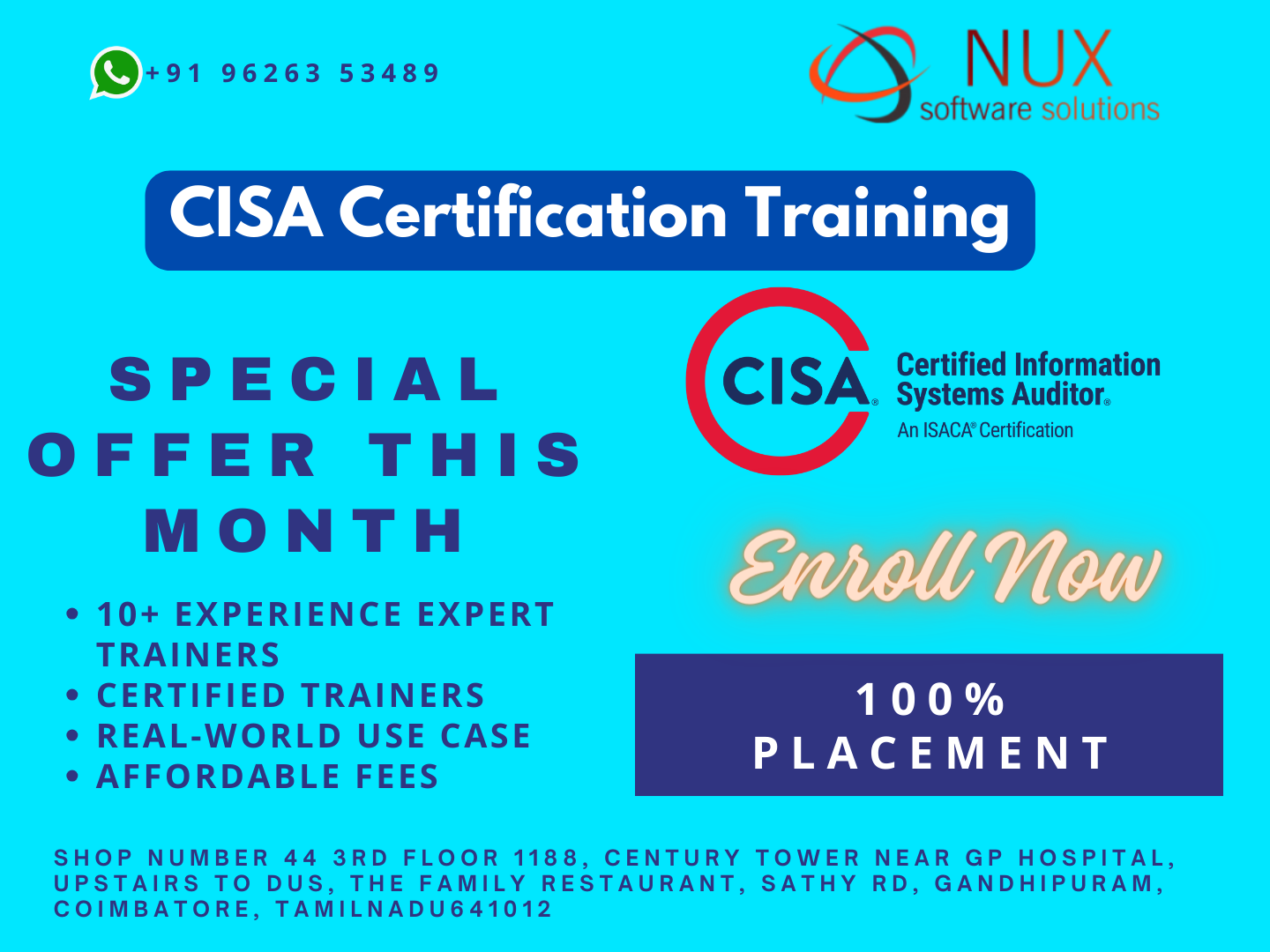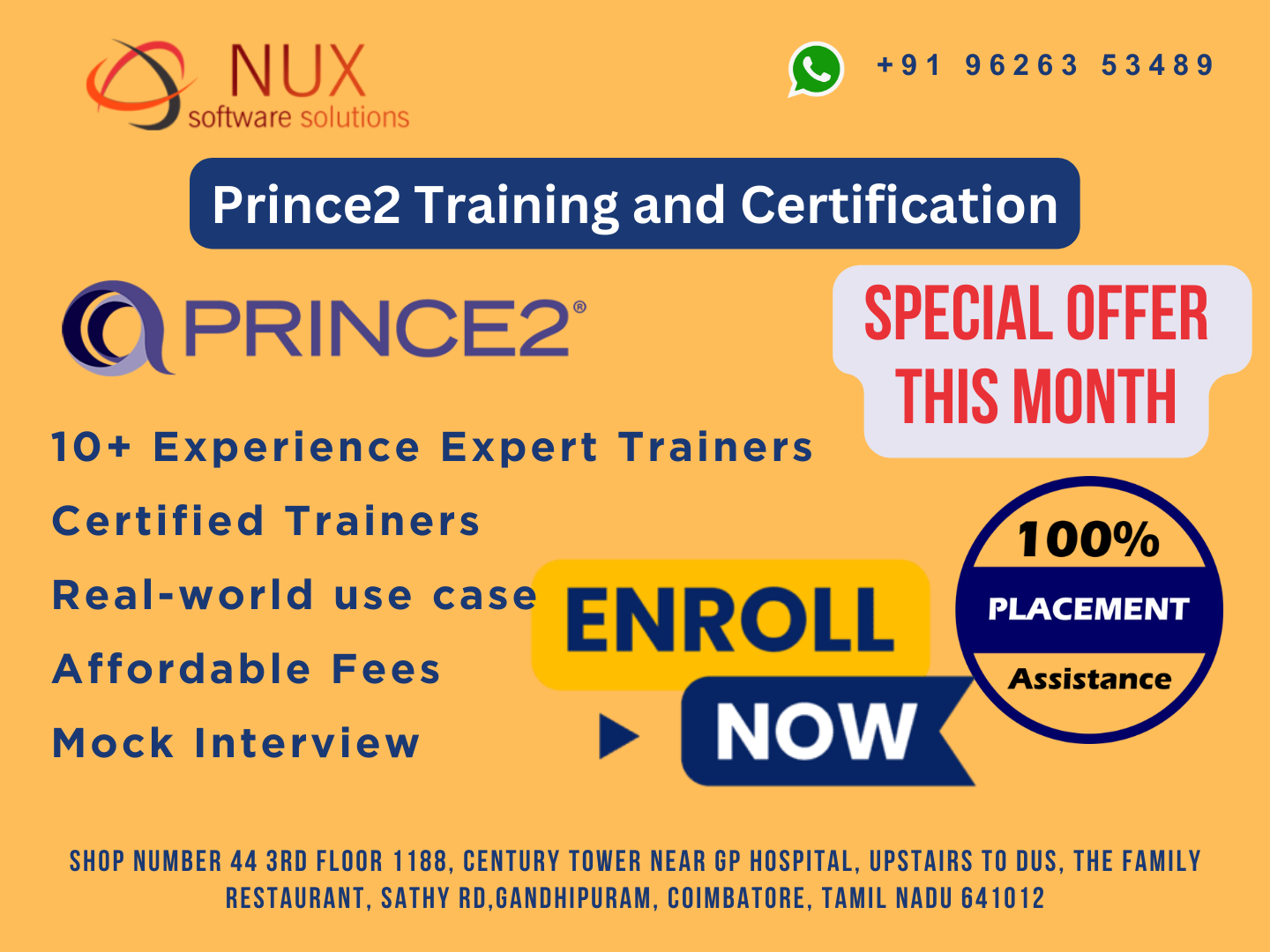CISA Certification Training


BestCertified Information System Auditor (CISA) training courses classes deliver by Nux software solutions in coimbatore. Nux software solutions in coimbatore has excellent and advanced training programs that will give you better performance & hands on experience. Our industry’s expert trainers offer a wide range of skills and experience in their graded areas.
The Training center environment is too good for professional, individual, corporate, live project training and industrial training. Labs infrastructure is advanced, well managed and you can access LAB 24X7 from anywhere. Training center has international expert trainers and they have excellent knowledge, real time industry experience.
Our Training programs combine with several innovative learning methods and delivery models. We understand your requirement and it will give you 100 percent growth for your career and provide the cost effective training programs and also work with flexibility for the trainees.
The Certified Information System Auditor (CISA) is an information security certification for security analysts. It was created by the International Information Systems Security Certification Consortium (ISC). The certification was created to ensure professionals in computer security have standardized knowledge of the field. Earning a Certified Information Systems Security Professional certificate can help you have a successful career as a computer security professional.
Accelerate your cybersecurity career with the CISM certification with Nux Software Solutions:
The first thing you need to know about the CISA exam is the five domains. This refers to the way the exam content has been organized or split into five different sections. The percentages of material in the exam covered by each section has recently changed with 2019 updates. I will highlight those changes a bit better below, but for now, here are the five domains.
Course Syllabus
Module
Chapter 1.INFORMATION SYSTEMS AUDITING PROCESS
- Providing audit services in accordance with standards to assist organizations in protecting and controlling information systems. Domain 1 affirms your credibility to offer conclusions on the state of an organization's IS/IT security, risk and control solutions.
A. Planning
IS Audit Standards, Guidelines, and Codes of Ethics
Business Processes
Types of Controls
Risk-Based Audit Planning
Types of Audits and Assessments
B. Execution
Audit Project Management
Sampling Methodology
Audit Evidence Collection Techniques
Data Analytics
Reporting and Communication Techniques
Chapter 2. Governance and Management of IT
- Domain 2 confirms to stakeholders your abilities to identify critical issues and recommend enterprise-specific practices to support and safeguard the governance of information and related technologies.
A. IT Governance
IT Governance and IT Strategy
IT-Related Frameworks
IT Standards, Policies, and Procedures
Organizational Structure
Enterprise Architecture
Enterprise Risk Management
Maturity Models
Laws, Regulations, and Industry Standards affecting the Organization
B. IT Management
IT Resource Management
IT Service Provider Acquisition and Management
IT Performance Monitoring and Reporting
Quality Assurance and Quality Management of IT
Chapter 3.Information Systems Acquisition, Development and Implementation
A. Information Systems Acquisition and Development
Project Governance and Management
Business Case and Feasibility Analysis
System Development Methodologies
Control Identification and Design
B. Information Systems Implementation
Testing Methodologies
Configuration and Release Management
System Migration, Infrastructure Deployment, and Data Conversion
Post-implementation Review
Chapter 4. INFORMATION SYSTEMS OPERATIONS AND BUSINESS RESILIENCE
- Domains 3 and 4 offer proof not only of your competency in IT controls, but also your understanding of how IT relates to business.
A. Information Systems Operations
Common Technology Components
IT Asset Management
Job Scheduling and Production Process Automation
System Interfaces
End-User Computing
Data Governance
Systems Performance Management
Problem and Incident Management
Change, Configuration, Release, and Patch Management
IT Service Level Management
Database Management
B. Business Resilience
Business Impact Analysis (BIA)
System Resiliency
Data Backup, Storage, and Restoration
Business Continuity Plan (BCP)
Disaster Recovery Plans (DRP)
Chapter 5.Protection of Information Assets
- Cybersecurity now touches virtually every information systems role, and understanding its principles, best practices and pitfalls is a major focus within Domain 5.
A. Information Asset Security and Control
Information Asset Security Frameworks, Standards, and Guidelines
Privacy Principles
Physical Access and Environmental Controls
Identity and Access Management
Network and End-Point Security
Data Classification
Data Encryption and Encryption-Related Techniques
Public Key Infrastructure (PKI)
Web-Based Communication Techniques
Virtualized Environments
Mobile, Wireless, and Internet-of-Things (IoT) Devices
B. Security Event Management
Security Awareness Training and Programs
Information System Attack Methods and Techniques
Security Testing Tools and Techniques
Security Monitoring Tools and Techniques
Incident Response Management
Evidence Collection and Forensics


